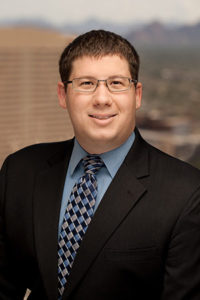

Doe v. Roman Catholic Church of Diocese of Phoenix
Arizona Court of Appeals
June 29, 2023
JSH Attorneys: Justin Ackerman & Elizabeth B.N. Garcia
In Doe v. Roman Catholic Church of Diocese of Phoenix, — Ariz. -, No. 1 CA-CV 22-0143 (June 29, 2023), the Arizona Court of Appeals affirmed the dismissal of the Plaintiff’s direct and vicarious liability claims against St. Mark parish and the Diocese of Phoenix (“Diocese Defendants”), based on sexual abuse committed by a priest that served at the parish.
In dismissing the direct liability claims against the Diocese Defendants, the Court applied the traditional tort rules holding an employer can be independently liable for an employee/agent’s sexual misconduct but only if the employer did something negligent, knowing or having reason to know the employee/agent was a risk of harm to others. The Court rejected the plaintiff’s claim that the perpetrator’s sexual relationship with another consenting adult, in violation of Roman Catholic Doctrine, put the Diocese Defendants on notice of the perpetrator’s risk to harm children. Equally insufficient to establish the Diocese Defendants’ were on notice of any risk of harm to children was the male perpetrator’s non-consensual sexual contact with another adult male, and evidence of a report of that contact, that was made to three priests who did not pass the information on to the Diocese Defendants. In dismissing the direct liability claims, the Court also ruled that, as a matter of law, “acts of sexual abuse by other priests cannot constitute notice of a threat of harm posed by [the perpetrator].”
The Court of Appeals also found that the Diocese could not be held vicariously liable for the acts of the priest, who was not working within the course and scope of his employment when the abuse occurred. In doing so, the Court declined the plaintiff’s invitation “to adopt the minority rule that priests or ministers may be acting within the scope of their employment when using their employer-granted authority to engage in tortious misconduct.” The Court of Appeals held that the test for determining whether a tortious act is in the scope of employment “is not whether the employer could have expected or foreseen it.” Instead, the test is “whether the employee ‘was performing a service in furtherance of his employer’s business.’” Applying the Restatement (Third) of Agency, the Court affirmed that an employer will not be vicariously liable “for an employee’s tortious act undertaken solely for the employee’s own purposes,” and found that the sexual abuse, which was done solely for the perpetrator’s “personal, apparently sexual desires” was not undertaken in the scope and course of his employment. The Court also narrowed the application of State v. Schallock, 189 Ariz. 250 (1997), which the plaintiff cited, holding that “Schallock is narrowly applicable to cases involving longstanding abuse and harassment in the workplace by a manager with authority to ‘hire and fire, promote and demote, [and] instruct and control’ subordinates the manager victimizes.” In the absence of such facts, Schallock did not preclude summary judgment on the plaintiff’s claims.
Finally, the Court of Appeals rejected the plaintiff’s reliance on House Bill 2466, which extended the statute of limitations for claims that can meet specific threshold requirements, finding it inapplicable because the trial court’s grant of summary judgment was not based on limitations grounds.
Justin Ackerman represents clients in federal and state appellate matters in cases involving excessive force, wrongful death, personal injury, bad faith, and premises liability. After graduating as the valedictorian of his class from Phoenix School of Law, Justin worked as a law clerk for the Hon. Michael J. Brown in Division One of the Arizona Court of Appeals. Following his clerkship, Justin has handled over 75 appeals, successfully arguing before the Arizona Court of Appeals, Arizona Supreme Court, and U.S. Court of Appeals for the Ninth Circuit. Justin has spoken at many seminars on appellate preservation topics and is recognized as a Southwest Super Lawyers Rising Star and Best Lawyers Ones to Watch in the area of Appellate Practice. He currently serves as the Chair of the Appellate Group at JSH.
jackerman@jshfirm.com | 602.263.4552 | jshfirm.com/jackerman
Elizabeth B.N. Garcia focuses her practice in federal and state appellate matters. Liz joins JSH after gaining experience at a multi-state firm where she handled class action defense and other complex litigation. In addition to her class action experience, Liz handled breach of contract and other sophisticated commercial litigation for clients across industries. After law school, she worked for the Arizona Attorney General’s Office as an Assistant Attorney General for Criminal Appeals and was named the 2017 Emerging Star for the Solicitor General’s Office. Liz honed her appellate writing and research skills through a judicial clerkship for the Honorable Maurice Portley at the Arizona Court of Appeals, Division l.
egarcia@jshfirm.com | 602.263.4486 | jshfirm.com/egarcia